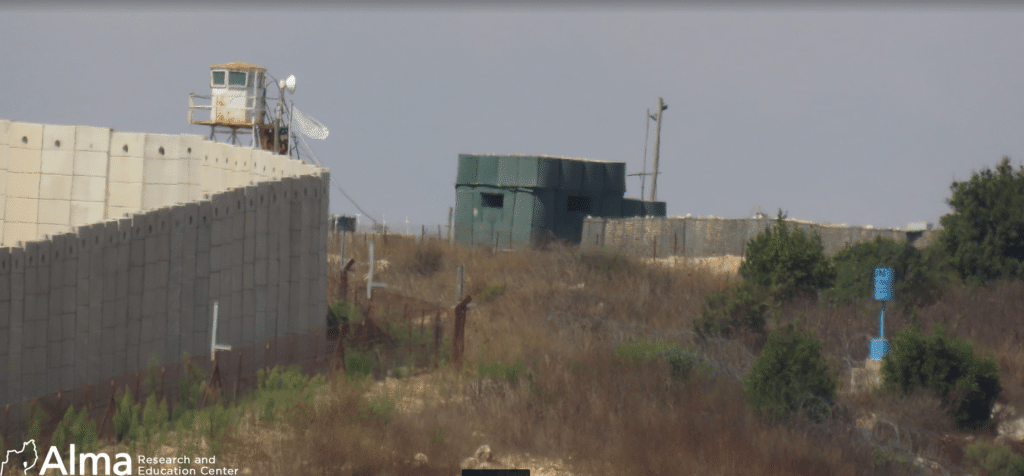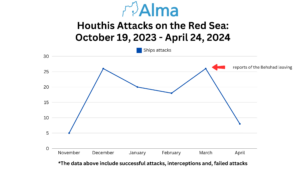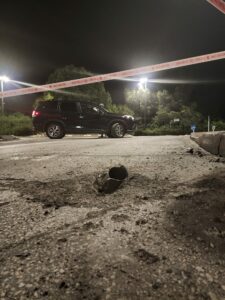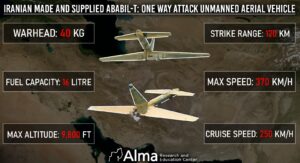What does Hezbollah want?
Hezbollah did not desire to be lured into the conflict by the Palestinians on October 7 and to come across as though it was being managed (“playing second fiddle”). Hezbollah was “forced” into the campaign on October 7, but on its terms – in a limited capacity; not as a tag-along, but as a supporter. Hezbollah joined the fight to enhance its narrative, although, it would have preferred to start the major conflict by itself. As far as Hezbollah is concerned, the current scenario is a win-win situation.
It should be noted that Hezbollah has been pursuing a policy of provoking Israel since the end of 2022 and throughout 2023. Hezbollah is interested in war with Israel but through its initiative and timing.
In our assessment, Hezbollah was already on the verge of implementing its plan to take over the Galilee by utilizing the Radwan force and its geographic units in southern Lebanon.
The ultimate objective of Hezbollah is to seize control of Lebanon and institute the Islamic Revolution there. As far as Hezbollah is concerned, a conflict against Israel will ultimately accomplish this objective and propel the organization closer to its goal. Hezbollah will indeed be damaged, but the Lebanese state and Hezbollah’s adversaries will also be harmed. On the day following the war, Hezbollah will emerge victorious by a significant margin and will be the fastest to recover. This will be made possible through its extensive civilian infrastructure in Lebanon (which is administered by the Executive Council) and with the assistance of Iran. A Lebanon in ruins is advantageous to Hezbollah for the advancement of its objectives. This is readily apparent when examining the outcomes of the Second Lebanon War in the context of time.
Hezbollah is ready and willing to go to war with Israel. It is not a question of if, but a question of when.
Hezbollah’s risk management recognizes the possibility of many of its operatives and entire systems being harmed (Israel believes that one-third of its operatives will be harmed). Finally, Hezbollah’s motivation is the philosophy of exporting the Ayatollah’s Islamic revolution in Iran and its final implementation in Lebanon.
Hezbollah’s losses and preparedness for war:
As of this writing, Hezbollah’s losses/casualties are over 100 operatives killed (we estimate that 10-15% of them were killed in Syria) and dozens in a total of standby positions (some of them may be empty), combat reconnaissance systems (observation devices), underground arrays (possibly storage places / residing tunnels / connecting tunnels, approaching tunnels, etc.), observation posts (some of them may be empty and without means), launching sites (usually referring to places from which rockets, mortars, and anti-tank rockets were launched or were expected to be launched) and weapons depots.
According to our estimates, the majority of Hezbollah operatives killed were not from the Radwan unit, but rather from Hezbollah’s geographic groups in southern Lebanon. Even if all of the operatives killed were from the Radwan unit, their operational capability remains unaffected.
In our understanding, a small number of sensitive sites (advanced means and capabilities) were also attacked.
The scope outlined above does not represent a significant blow to Hezbollah and does not seriously jeopardize the competence of the various systems – with a focus on the main systems, the fire array, and the Radwan unit.
The quantity and scale of Hezbollah’s deployment of military locations in Lebanon is unprecedented, large, extensive, and spread across the country.
Therefore, at any given moment, on the decision, Hezbollah can employ its rocket fire arrays and missiles against Israel on a very large scale and from all Lebanese territory. This is with an emphasis on the strategic formations that are not deployed south of the Litani River at all.
The geographical location of the Radwan operatives does not affect the unit’s ability to invade Galilee. It should be remembered that this is a dominant mission of the unit, and even if its operatives retreat to a rear line (the Litani River, for example), this does not impair their preparation, organization, and operation. It is important to note that the unit’s preparations and organization for an invasion, would have been carried out, in any case, from rear lines. Even though the IDF’s deployment today on the border is different, in terms of extent and deployment, Hezbollah is constantly gathering intelligence and adapting its plans to meet the new situation. In addition, keep in mind that the geographical distance of the Litani River varies and there are areas where the river runs very close to the Blue Line.
The population’s support:
The vast majority of Shiite society is Hezbollah’s captive audience. This is done out of desire and devotion (on religious-ideological grounds), or out of fear or dependence (created by Hezbollah’s civilian infrastructure, led by Hezbollah’s Executive Council, which is parallel to state institutions and provides effective services as an alternative to the states inadequacy).
Despite a few dissenting voices, it cannot be deemed that Shiite society opposes Hezbollah. Although there is Shiite opposition to Hezbollah inside Lebanon, it is very small and powerless. Even if someone from this opposition “dares” to stand up against Hezbollah, he is immediately neutralized. Hassan Muhsen, a well-known former Hezbollah operative, is a recent example of this. Because of an internal struggle, the latter has become a vociferous opponent of Hezbollah, which, among other things, over the past year, has publicly burned pictures of Nasrallah and Khamenei. A few days ago, he was assassinated by the Lebanese internal security forces (allegedly). It is believed that Hezbollah was behind the assassination.
Shi’ite society in Lebanon does not present Hezbollah with any dilemma of whether to join/embark on the campaign in the face of harm to the population. Hezbollah will protect the “captive audience.”
As of today, the “Shiite duo” does not disappoint in times of emergency. Amal operatives support the resistance and, in any event, will not condemn Hezbollah for standing up to the Zionist adversary. It should be noted that Amal military operatives are currently involved in Hezbollah’s military operations and have even been killed.
An interesting case study was Mohsen’s funeral. How many people came to his funeral? We counted a few dozen (30-40 people). Apparently, there are not many people in the Shi’ite community who supported Muhsen and appreciated his activity against Hezbollah… (and as we mentioned above, fear also creates a captive audience…).
Another case that deserves consideration is Wiam Wahhab’s statement on December 13. Wahhab is Druze, former minister of environmental protection, and one of the founders of the “March 08 Camp” – pro-Hezbollah party. Wahhab said that the hostilities on the border must stop. He added that despite the sacrifice of the shaheeds, the pressure on the Gaza Strip had not eased and that in general, “we grow tired.”
Wiam Wahhab, who is known to voice independent opinions from time to time, ultimately represents a Druze segment rather than the Shiite base. To all those who are quick to create an ideology out of his words and hang on to them, we would recommend not to rush.
Non-Shiite voices opposing the war are self-evident, coming from the March 14 camp, which traditionally opposes Hezbollah.
For the sake of clarity, the other populations in Lebanon (Christians / Sunnis / Druze / Palestinians) do not constitute a consideration in Hezbollah’s eyes when it comes to launching a confrontation against Israel. In recent years, Hezbollah has even worked to create dependency mainly among the Sunnis in northern Lebanon and the Palestinians.
“Destruction” in southern Lebanon:
Primarily, there is a tendency on the part of the Lebanese side to attempt to exacerbate the devastation in southern Lebanon. At present, this pronouncement of intensification lacks any foundation.
The IDF attacks in southern Lebanon, damaged Hezbollah assets in villages, sometimes inside homes. However, it should be emphasized that these are very precise targeted attacks against Hezbollah sites located in the vicinity of human shields inside villages. From these sites, Hezbollah conducts the confrontation (they serve as operations rooms), or carries out a shooting or surveillance assisting the attacks against Israel. These are only a few dozen houses used by Hezbollah that were damaged throughout southern Lebanon.
In the past week, we have noticed an escalation in IDF activity (some of which was even initiated). In our assessment, the forcefulness of the IDF’s operation also stems from the intensity of Hezbollah’s action/damage against Israel and the type of weapons used by Hezbollah.
For example, on December 10 Hezbollah carried out a UAV and a Burkan rocket attack against Israel. These attacks resulted in Israeli injuries. The Israeli response was an unusually intense airstrike on a number of adjacent houses in the village of ‘Atun (obviously not innocent targets). The extent of destruction in civilian built-up areas in this case was different than usual. On December 16 Hezbollah also carried out a UAV and Burkan attack. One of the suicide UAVs exploded in the area of the community of Margaliot, killing an IDF soldier. In response, the IDF attacked an unusual geographical area far from the border in Houmin El Tahta (about 40 kilometers from the border).
The State of Lebanon and a Political/Diplomatic Settlement:
The State of Lebanon and the Lebanese government are not a factor. Statements such as that the Lebanese people and/or the Lebanese state and/or the Lebanese government do not want war are irrelevant.
Individuals who express their opposition to war in this manner are either members of the political camp that has already renounced Hezbollah (March 14) or those who define themselves as “neutral.”
In Lebanon (like many other things), it begins and ends with Hezbollah. Only Hezbollah will decide whether it wants war or not.
With Hezbollah, it is impossible to reach a “political settlement.” Hezbollah is not committed to any political arrangement that will be made with the representatives of the state of Lebanon. The best example of this is UN Resolution 1701, which in practice became irrelevant immediately upon its implementation.
Hezbollah will always find the reason why the “resistance” against Israel must continue. Israel is a platform and tool for Hezbollah to realize its goal of taking over Lebanon. Israel is the ostensible reason for justifying Hezbollah’s resistance and military power.
A small example from the last period before the war: the diplomatic attempt to move the Hezbollah tent on Har Dov. Had the war not broken out on October 7 and Hezbollah had not joined to aid Hamas on October 8, in our assessment the tent would still have been in place.
Who will enforce the political/diplomatic arrangement? And what’s his deadline? And what price will Israel have to pay?
The Lebanese Army:
In one word: demographics. Today, about fifty percent of Lebanese army soldiers and officers are Shiites. Even now, Lebanese army soldiers and officers are directly assisting Hezbollah. In our assessment, many soldiers and officers, and even entire units, will join the fighting against Israel alongside Hezbollah if Israel maneuvers in Lebanon (unlike in 2006, when the Lebanese army did not intervene and remained in its bases and was not even deployed in southern Lebanon).
At best, if the army is passive, it will serve as a human shield for Hezbollah (which is already happening).
The Lebanese army will not enforce a political settlement. Partly because it doesn’t want to, and mainly because it can’t deal with Hezbollah. Demographics and ethnic ties win. To be clear, the Lebanese army did not enforce 1701 because of a lack of will and inability.
Reinforcing the Lebanese army with resources and increasing its presence will only help Hezbollah in routine times and in war. More resources will flow to Hezbollah and the use of the Lebanese army as a human shield will be broader.
UNIFIL:
A group that is irrelevant in its current form. Although it is the largest peacekeeping force in the world with 10,000 soldiers, it has no military influence on what is happening today on the border and had no influence before (except for civilian assistance to the population).
Changing the wording of resolution 1701 and strengthening UNIFIL’s mandate so that it is also defined as an additional enforcer of the resolution and not only as helping (the Lebanese army) to enforce it, is not relevant. In recent years, we have seen many examples of what Hezbollah does to UNIFIL forces that accidentally or unintentionally enter areas where it is not allowed to move without coordination with the Lebanese army. UNIFIL is blocked and attacked, and sometimes its soldiers are injured and their equipment looted. Even with full authority, UNIFIL forces will not be able to maneuver where Hezbollah does not want them to. UNIFIL’s freedom of action and movement will be severely limited, making it impossible for it to exercise its authority in any case.
Any attempt by UNIFIL or any other international force to enforce a political arrangement to expel Hezbollah or the Radwan unit north of the Litani, will end in violent confrontation and loss of human life to the international force – are the participating countries ready for this?
Hamas-Lebanon:
For several years, Hamas Lebanon has been building up a vigorous force, both in terms of equipment and weapons and in terms of recruiting operatives. In light of what is happening in the Gaza Strip and in light of the intention to completely neutralize Hamas in the Gaza Strip in general and its military capabilities in particular, it seems that the military center of gravity will shift to Hamas-Lebanon. This is under Iranian auspices, guidance, and support.
Summary:
Any “political arrangement” will be for appearances only and will not truly solve the Hezbollah problem. On the contrary, Israel can only be further harmed by the price it will pay (for example, the evacuation of the northern part of the village of Ghajar. It should be noted that the entire population in the northern part has Israeli citizenship). In such a case, if and when, from a Middle Eastern perspective, Israel has lost…
On the other hand, a significant military operation against Hezbollah has a high price in terms of the damage that such a confrontation will cause both Israel and Lebanon. It is reasonable to assume that as a result of such a confrontation initiated by the IDF, Hezbollah will fully employ its fire systems – from within the civilian zones in Lebanon and against the civilian areas in Israel.
Moreover, military action will not be a permanent solution, but a temporary solution for several years.
But after the massacre on October 7, it is the obligation of the Israeli government as well as Israel’s friends around the world to ensure that such a massacre does not happen – both from Gaza and from other borders. Therefore, despite the heavy price expected from military action, it is better than a political settlement that would be a false pretense and would even cause Israel to “lower its guard”, which is now in full readiness.
To this end, it is now necessary to work with the international powers to formulate a joint strategy, under the working assumption that if there is no large-scale military operation against Hezbollah, Lebanon will be doomed. Lebanon will become under complete Hezbollah-Shiite control. It is also possible that an Islamic regime similar to Iran will be instituted there, or at least in parts of it.
Israel must take constant military action against Hezbollah. If it fails to do so, Hezbollah and Iran’s strategic threat to Israel will only increase over the years. The days of Israeli concern over Hezbollah’s equation-response in Lebanon are over. In the short term, Israel must act forcefully against Hezbollah’s significant military systems, such as the rocket/missile fire arrays and the Radwan unit. Over time, Israel must maintain its policy of “mowing the lawn” against the military capabilities of both Hezbollah and Hamas in Lebanon.






